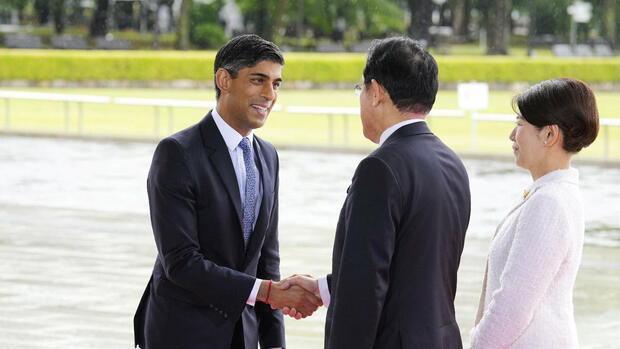British Prime Minister Rishi Sunak on his arrival in Hiroshima.
(Photo: via REUTERS)
Hiroshima The US, EU and UK announced fresh sanctions against Russia on Friday ahead of the G7 summit in Hiroshima, Japan. According to US officials, the latest US sanctions package includes “broad restrictions on categories of goods critical to the battlefield” and about 70 facilities from Russia and third countries by being blacklisted by the US Department of Commerce prevent US exports.
In addition, the United States would announce around 300 new sanctions against individuals, entities, ships and aircraft, targeting “financial intermediaries”, Russia’s future energy generation capabilities and others in Europe, the Middle East and Asia who support the war.
British Prime Minister Rishi Sunak is set to announce a ban on Russian diamonds and imports of metals such as copper, aluminum and nickel from Russia in support of Ukraine. Britain is also targeting another 86 individuals and companies from Russian President Vladimir Putin’s military-industrial complex operating in the energy, metals and shipping industries, the government said in a statement.
>> Also interesting: G7 meeting: peak of the self-righteous
EU Council President Charles Michel confirmed on Friday that Russian diamonds should be on the new sanctions lists and that Great Britain wants to ban imports. All measures are aimed at further reducing the income of the Russian state after the attack on Ukraine. The export of raw materials is the main source of income of Russia.
Sanctions from Canada and Japan also expected
The G7 want to coordinate their new sanctions against Russia at their three-day summit beginning on Friday, their resolutions are not legally binding. The 27 EU states are currently working on an 11th package of sanctions against Russia, which has not yet been completed. EU sanctions against Russian goods are considered particularly effective because the Union is a much larger trading partner for Russia than, for example, the USA or Great Britain. Japan and Canada are also expected to announce new sanctions.
In the preliminary negotiations for the summit, the USA was not able to push through with the proposal to change the sanctions system in order to prevent circumventions. The idea was a complete export ban, which should be supplemented with a list of exceptions. Now, however, the opposite is the case, with bans on individual goods and groups of goods being imposed and extended.
Before the G7 meeting in Hiroshima, Federal Chancellor Olaf Scholz and Japanese Prime Minister Fumio Kishida emphasized their commitment to a rules-based international order. Both countries would work together, they emphasized at a bilateral meeting before the start of the summit.
>> Read also: What Scholz can learn from Japan for the turning point
The Japanese Presidency announced that both had also discussed closer cooperation with emerging countries and the security situation in East Asia. This year Japan took over the presidency of the most important western industrialized countries from Germany. Scholz met Canada’s Prime Minister Justin Trudeau last night.
The summit begins today with a visit by the heads of state and government to the Peace Museum to commemorate the atomic bombing of today’s megacity in 1945. Both countries, which are among the world’s largest economies, are committed to reforming international organizations such as the UN Security Council and demand a permanent seat on the highest UN body.
The topics of the G7 deliberations in the afternoon will first be the state of the world economy and then continued support for Ukraine. It should also be about dealing with China. The summit lasts until Sunday, then Scholz flies on to South Korea. The G7 includes the US, Japan, Germany, France, the UK, Italy and Canada.
More: Guest commentary: The G7 summit in Hiroshima represents a commitment to a free international order
